TechRadar Verdict
Salesforce Marketing Cloud blew us away with its powerful Journey Builder and integrated suite of marketing Studios, but its steep learning curve and high price point may deter small businesses.
Pros
- +
Powerful automation tools (Journey Builder)
- +
Sophisticated email marketing
- +
Seamlessly interconnected ecosystem of apps
Cons
- -
Steep learning curve
- -
High price point
Why you can trust TechRadar
Salesforce Marketing Cloud is an all-in-one marketing platform built on Salesforce—the world’s best CRM software solution. It provides a suite of apps—including email marketing, social media marketing, advertising, and SMS marketing tools—that can help you to create personalized customer journeys and engage prospects across every channel. In this Salesforce Marketing Cloud review, we’ll tell you everything you need to decide if its right for your business.
Salesforce Marketing Cloud review: Snapshot
Salesforce Marketing Cloud is an enterprise-level marketing solution built for businesses that require the very best.
It offers some of the most advanced and powerful marketing tools available, including the industry-leading Email Studio, Mobile Studio, Advertising Studio, and Journey Builder, all constructed on top of the core Salesforce customer relationship management (CRM) system. AI is built into everything so you can personalize your customer journeys intelligently.
Despite all that, it may not be the right solution for smaller businesses with limited budgets and resources. It has a huge learning curve and can be difficult to implement and manage. Plus, it isn’t the most affordable solution around.
Even the most inexpensive editions of Salesforce Marketing Cloud can set you back hundreds (if not thousands) of dollars per month, which is out of the question for many SMBs and startups.
If you don’t need access to such a sophisticated feature set, it may be more economical to use a platform like Mailchimp instead, which provides many of the same features (i.e. email marketing and a journey builder) at a much more affordable price point.
Score: 4.5/5
Read on for our full and detailed review.
Salesforce Marketing Cloud competitors
| Header Cell - Column 0 | Salesforce Marketing Cloud | Marketo | Mailchimp |
|---|---|---|---|
| Score | 4.5/5 | 4/5 | 4.5/5 |
| Pros | - Highly extensible with flexible infrastructure and thousands of third-party integrations in the AppExchange - Sophisticated journey builder - Omni-channel marketing solution | - Easy to use - Best-in-class marketing automation - Sophisticated content personalization | - Powerful email marketing - Very affordable and beginner-friendly - Excellent support |
| Cons | - Steep learning curve - Difficult to implement and maintain - Expensive | - Clunky landing page builder - Expensive | - Limited personalization - Not very flexible |
| Verdict | Salesforce Marketing Cloud is a true enterprise-level marketing platform, offering unparalleled sophistication and industry-leading marketing apps seamlessly integrated into the powerful CRM ecosystem. | Marketo’s simplified pricing model and intuitive user interface make it an easy-to-use alternative to Salesforce for large businesses with smaller data sets. | With a robust data security framework, best-in-class support, and competitive pricing, Mailchimp is an affordable alternative for small businesses. |
| View deals | Visit site | Visit site | Visit site |
Salesforce Marketing Cloud: Key features
Salesforce Marketing Cloud is made up of various studios, which work hand-in-hand to enable marketers to build personalized, omnichannel customer experiences.
Journey Builder (customer lifecycle management)
The heart of Marketing Cloud is the Journey Builder. It makes it easy to take your customers on customized journeys by mapping them out in a visual flow chart. The interface is a blank canvas onto which you add controls, events, and actions, and connect them together to create automation sequences.
Email Studio
You can create emails to add to your customer journeys in the Email Studio. This is an enterprise-level email marketing platform that enables users to build email messages using templates and a drag-and-drop editor, customize and personalize them for different audience segments, set up triggered automations, and more.
Mobile Studio
The Mobile Studio lets you connect with customers via SMS, messaging, and push notification. It provides pre-made templates for different kinds of mobile messages, like SMS opt-ins, appointment confirmations, and mobile surveys. You can even use it to set up geofenced offers.
Social Studio
The Social Studio connects marketers with their customers across different social channels like Facebook, Twitter, and Instagram. You can use it to uncover insights about brand sentiment, listen in (and respond) to what social users are saying about your brand, create and publish social content, and even launch social advertising campaigns.
Advertising Studio
The Advertising Studio connects your advertising campaigns with your marketing and CRM data to create personalized customer journeys. You can advertise on Google, Facebook, and YouTube directly through Salesforce.
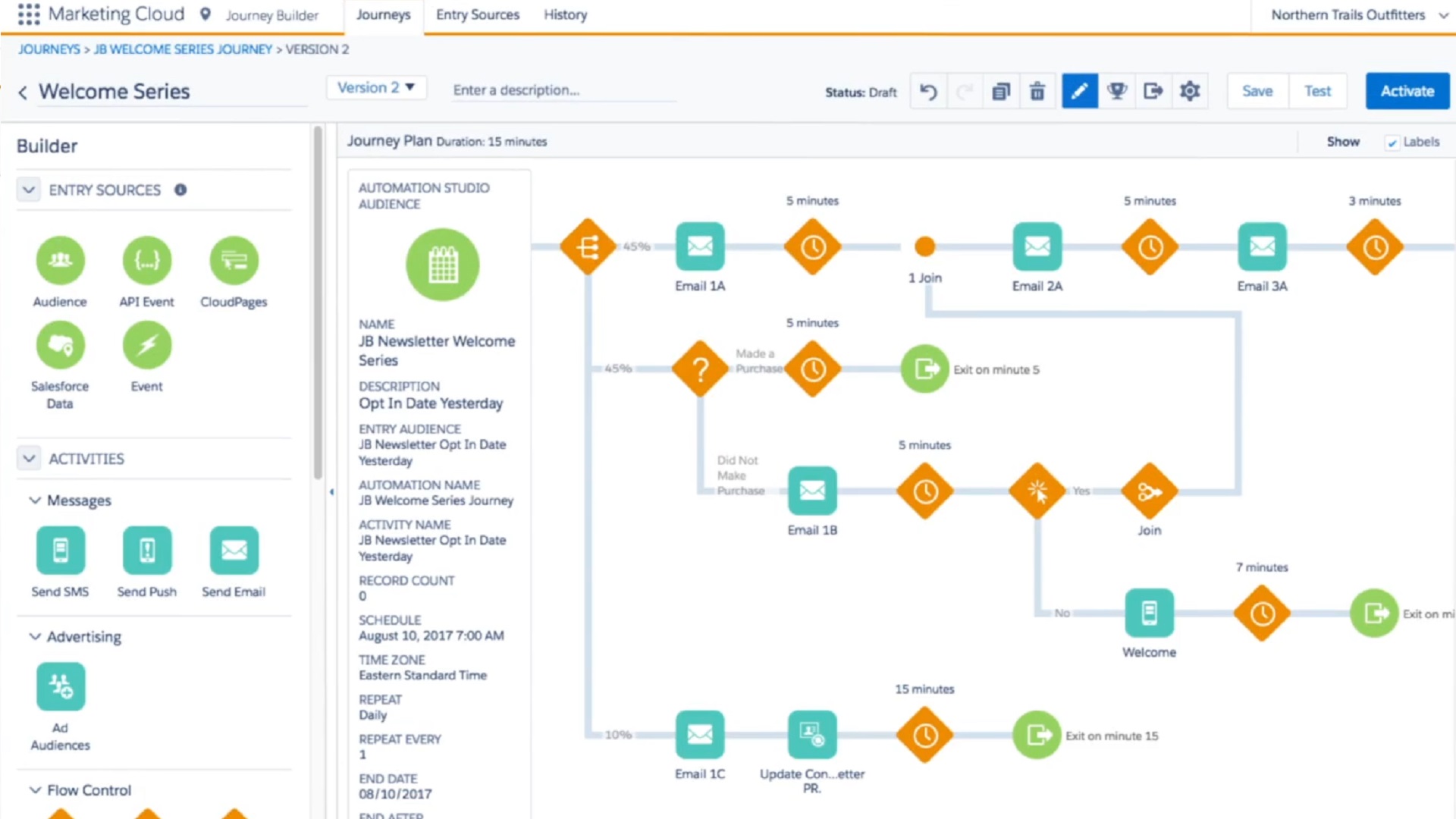
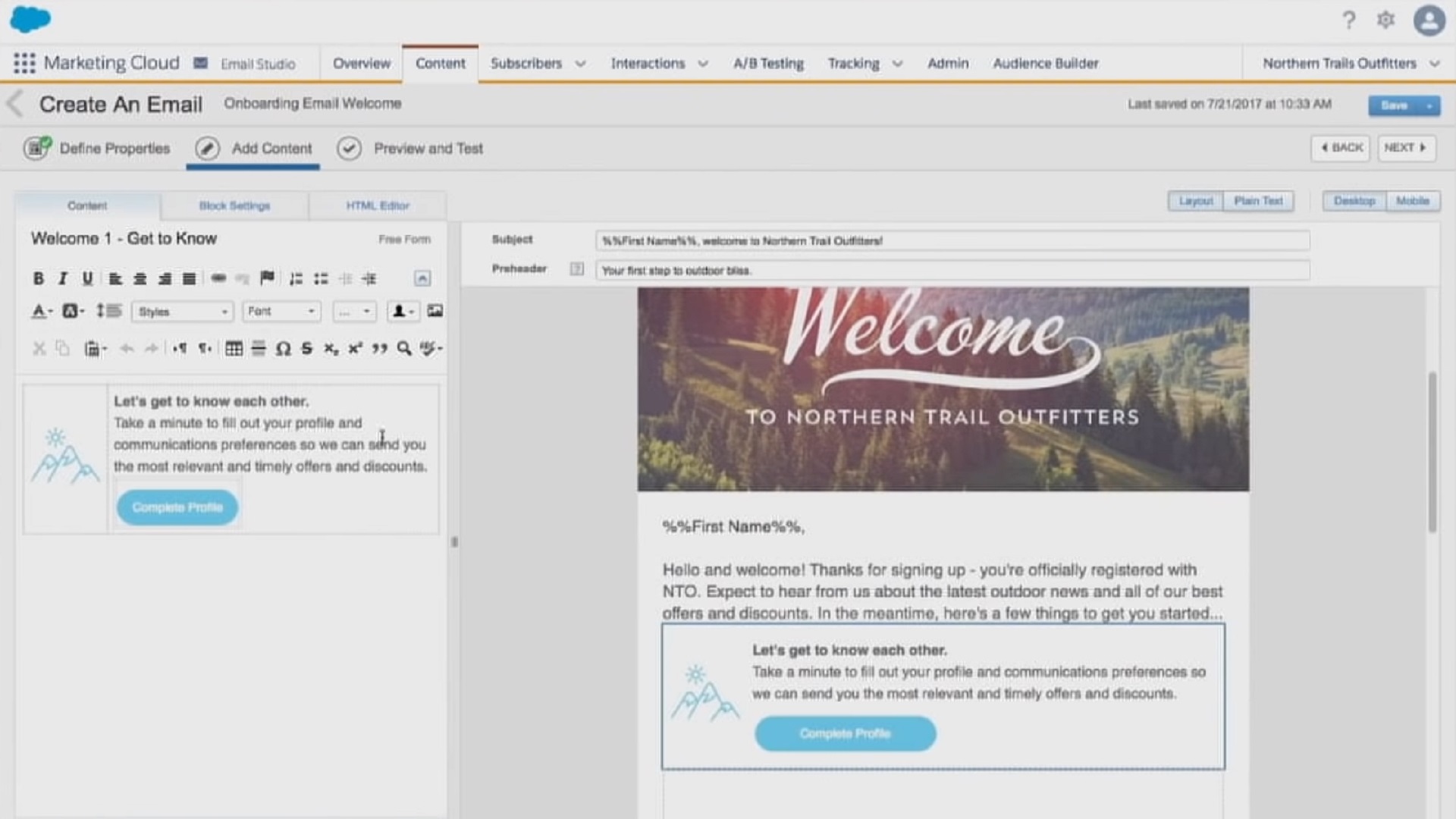
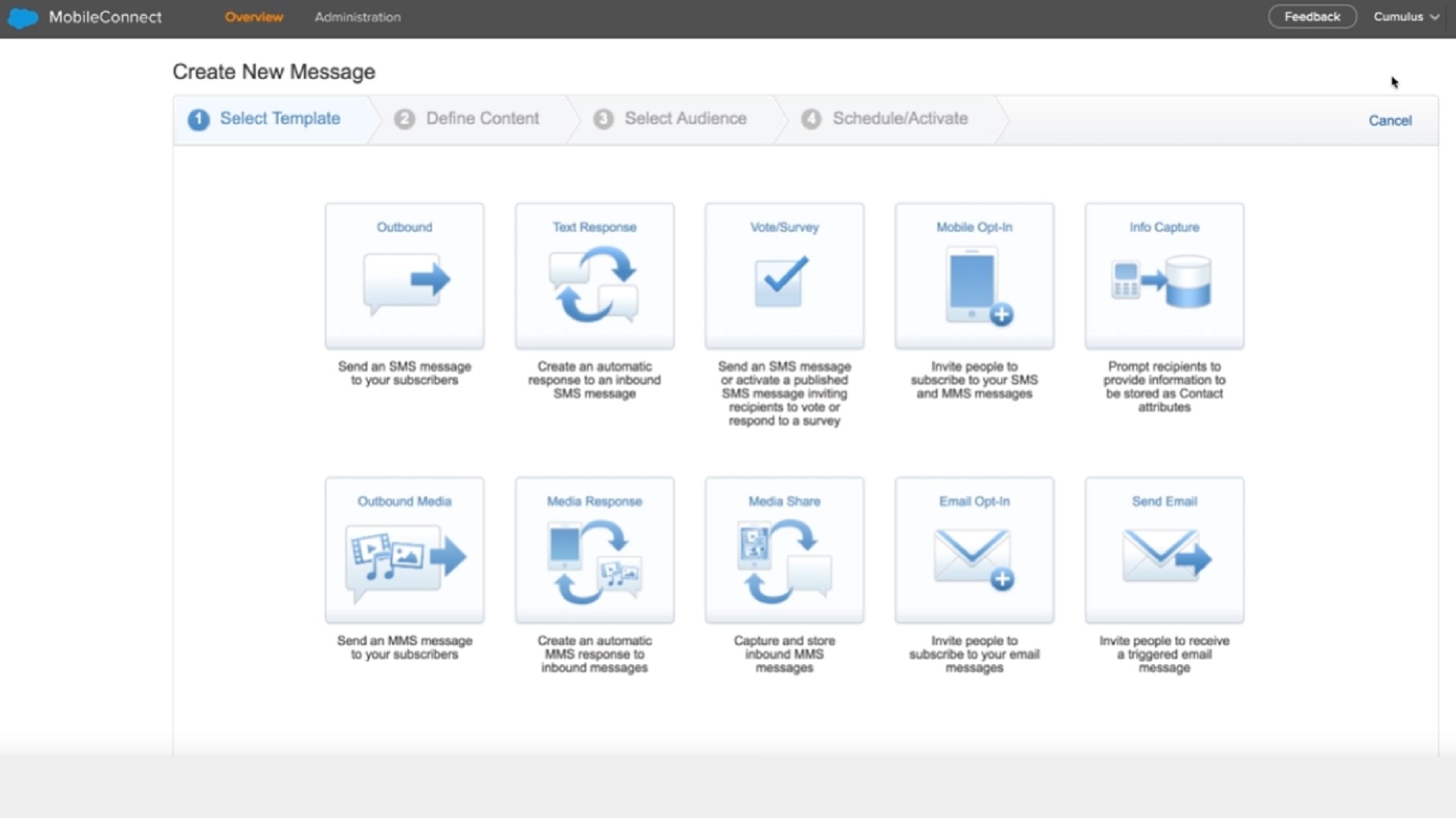
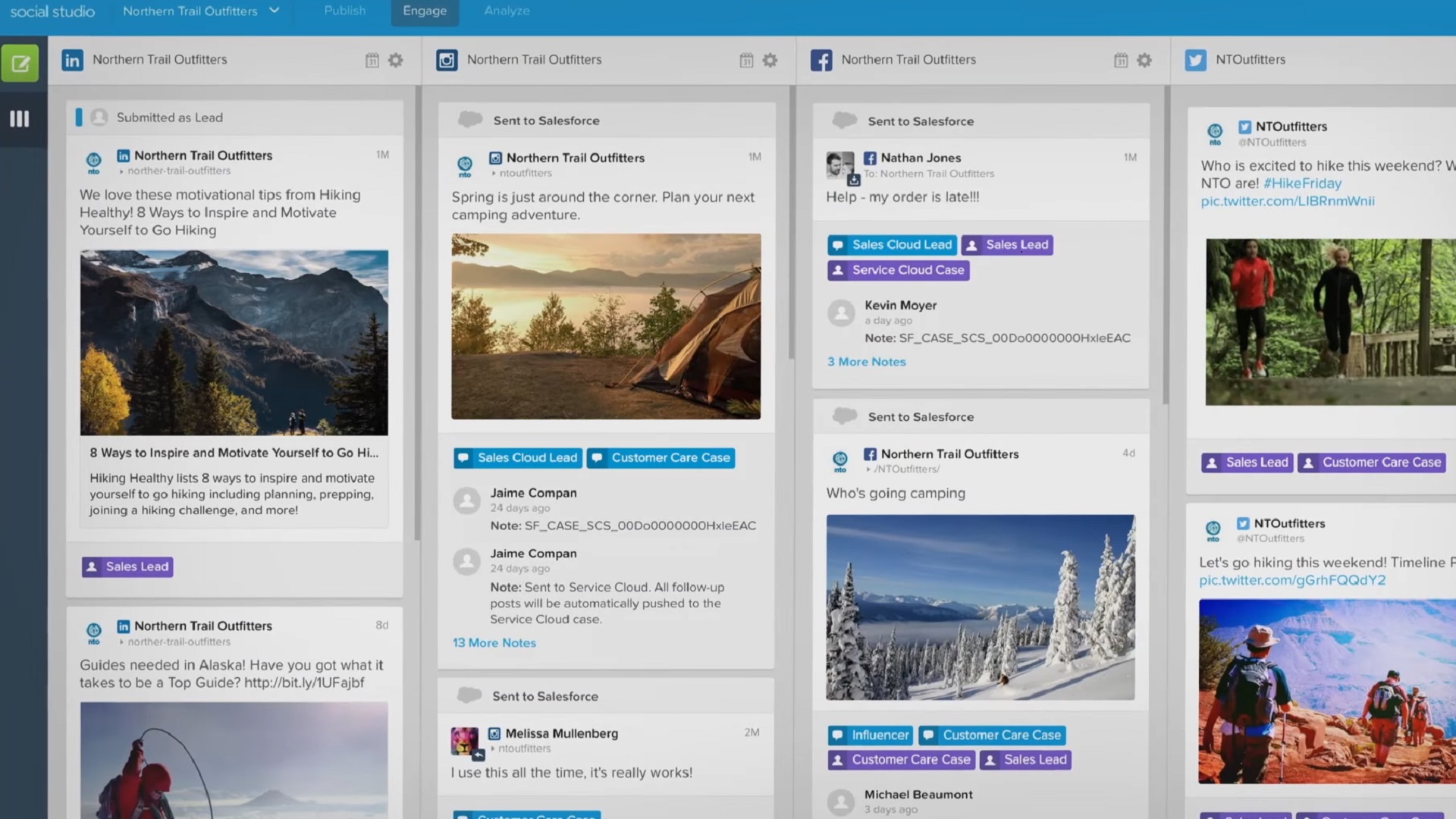
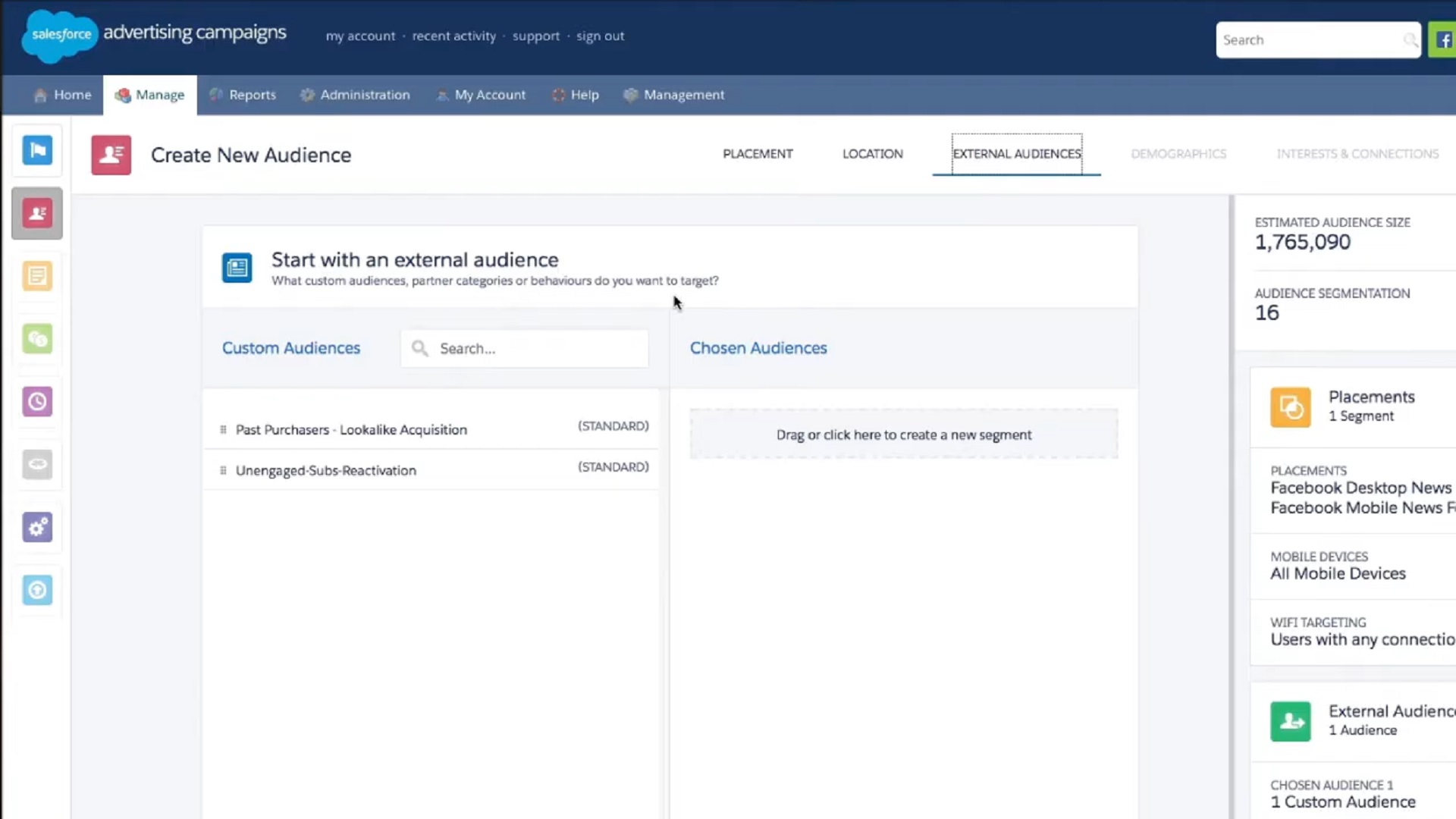
Benefits: All of the above modules work together in a seamlessly connected ecosystem, which is what makes Salesforce Marketing Cloud so powerful. Instead of connecting a bunch of different third-party tools together, you have everything you need in one place.
Drawbacks: The flipside to that broad feature set is that it can be overwhelming. Businesses will typically need a dedicated administrator to oversee implementation and management, which might not be feasible for small businesses.
Salesforce Marketing Cloud: What’s new?
Salesforce is constantly evolving. In June this year, the company acquired workplace communication tool Slack to create Slack-first Customer 360—a single, unified platform for connecting employees, partners, and customers.
Salesforce also regularly releases updates to the Salesforce Marketing Cloud, each of which brings new features and improvements.
In its latest release, Salesforce implemented various enhancements including an upgrade to its mobile marketing toolkit. Users can now create custom app events, orchestrate customer journeys based on app usage, and connect the Journey Builder with the mobile app SDK.
Other updates in the latest release include extensibility enhancements, advanced data intelligence, Personalization Insights for the Interaction Studio App, and the Journey Builder Activity. The latter enables users to share identity, actions, and attributes between the Journey Builder and Interaction Studio and create segments and triggers across channels.
Salesforce Marketing Cloud: Pricing
Salesforce Marketing Cloud is broken down into several different Editions. Editions are product packages that combine multiple modules together to fit a particular use case. Within each Edition, there are several pricing tiers. Higher-priced tiers typically unlock more advanced features.
Below, we’ve listed prices for Salesforce Email, Mobile, and Web Marketing Edition. Other Editions that form part of the Marketing Cloud such as the Social Studio, Advertising Studio, and Interaction Studio are priced separately. You can find individual pricing pages for each Edition on the Salesforce website. All the Salesforce plans listed below are billed annually.
| Plan type/feature | Basic | Pro | Corporate | Corporate | Marketo - Select | Mailchimp - Essentials |
|---|---|---|---|---|---|---|
| Cost per month | From $400/org/month | From $1,250/org/month | From $3,750/org/month | Custom pricing based on contact and message volume | Custom pricing | $9.99 (based on 500 contacts) |
| Cost per year | $4,800/org | $15,000/org | $45,000/org | See above | Custom pricing | $119.88 (billed monthly) |
| Email marketing & content creation | ✓* | ✓ | ✓ | ✓ | ✓ | ✓ |
| Journey Builder | X | X | ✓ | ✓ | X | ✓ |
| Mobile Messaging | X | X | ✓ | ✓ | X | X |
| Manage Multiple Businesses | X | X | X | ✓ | X | X |
*Basic/limited functionality compared to Pro
Testing Salesforce Marketing Cloud
We tried out Salesforce Marketing Cloud for ourselves to test how easy it was to use and deploy. First, we looked at how easy it was to learn the ropes after signing up. Then, we looked specifically at two core features: the Email Studio and the Journey Builder.
How easy is it to learn how to use Salesforce Marketing Cloud?
Salesforce Marketing Cloud is a very advanced platform, so it can be complex to operate. Proper implementation and management require a specialized team. Typically, you’ll need a business consultant to help establish your business needs and a marketing automation technician to implement processes.
They will both need to work alongside other team members who specialize in different marketing verticals. This may include a paid media specialist to operate the Advertising Studio module, an email marketing specialist to oversee the Email Studio, and a community manager to operate the Social Studio module.

Learn about the ins and outs of Salesforce's online library, virtual classes and tutorial software to see how Trailhead Academy could help you or your employees understand
It can take a long time to learn how to use these different modules, which is why Salesforce is best suited to larger businesses that have plenty of resources.
However, the good news is that Salesforce has an online training program to help with the onboarding process, called Salesforce Trailhead.
Trailhead is free and can teach your team how to use Salesforce Marketing Cloud effectively. It’s fun, engaging, and even offers four certifications specifically for Salesforce Marketing Cloud: Email Specialist, Administrator, Developer, and Consultant.
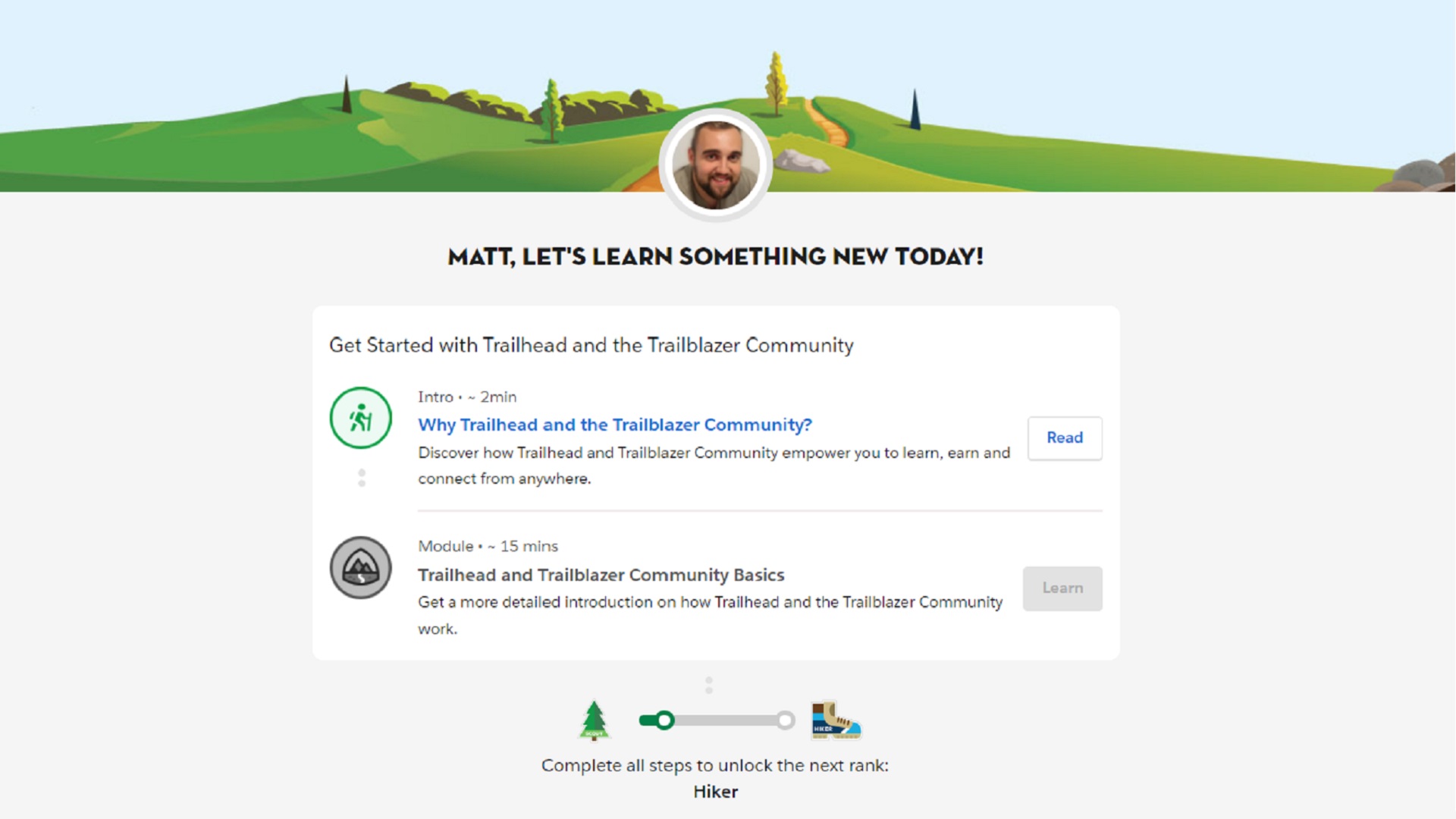
How intuitive is the Email Studio?
We found the Email Studio to be incredibly easy to use. It's similar to many other email marketing builders out there, with a modern, no-code, visual interface.
You can start building emails from scratch or from an existing template in your content library. Once you've chosen a template, you can customize it in the cross-channel editor. It's all very simple: you just drag and drop blocks and other content in from the left sidebar and then adjust the settings and styling options.
You get a real-time preview of all your changes on the main screen, and once you're done, you can test send it to your internal mailboxes before rolling it out to real contacts. You can also easily set up personalization if you want to send out different email variants to different customer segments.
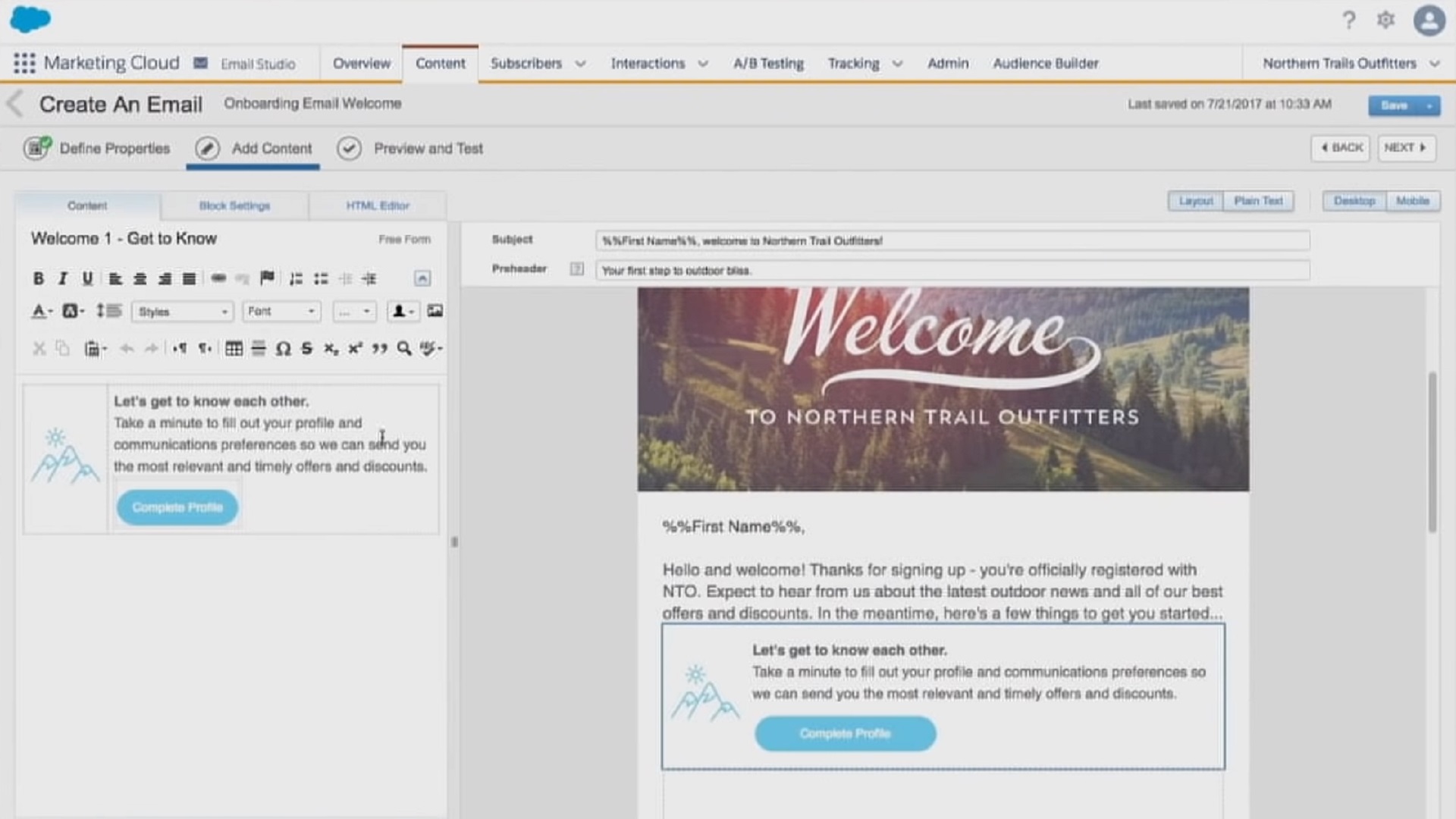
How intuitive is the Journey Builder?
The Journey Builder is a little more complicated than the Email Studio, so it can take a while to get the hang of it. However, once you know how it works, it's surprisingly intuitive. You simply drag and drop activities onto the canvas from the left-hand sidebar to build your customer journey.

Find the right range of tools for digital content marketing management, social media, paid or organic advertising, and marketing sales all in one place with our handy guide on the top content marketing tools available today.
You start by adding an Entry Source, which is how you choose the audience and method of entry into the journey for your contacts. For example, you might want to trigger entry into a certain customer journey when someone makes a purchase.
Under the Activities tab, you can add different types of messages to the flow. For example, you might want to add an SMS message as the next step in the journey so that when customers make a purchase, they automatically receive a text with their order confirmation.
Flow controls allow you to build logic into the automation sequence and set up personalized journeys for different customer segments. For example, you might drop in an Engagement Split control to route customers into different paths based on whether they clicked on an email.
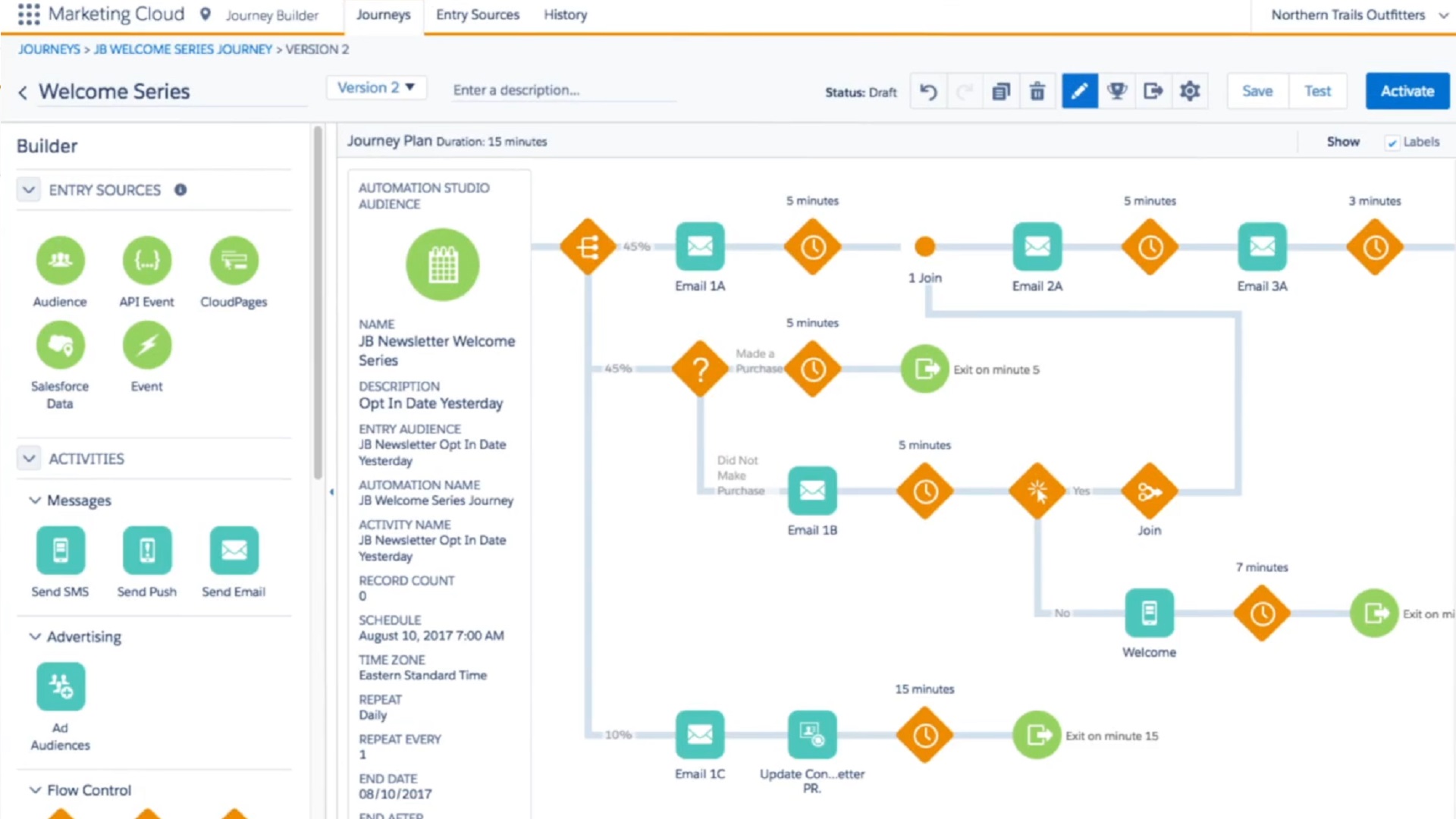
Alternatives to Salesforce Marketing Cloud
Like Salesforce Marketing Cloud, Marketo is another enterprise-level marketing platform with a broad feature set. It offers several similar features to Salesforce Marketing Cloud, including best-in-class marketing automation, email marketing, and lead management tools. The main difference is that Marketo has a UI that's easier to navigate and a simplified pricing model.
If you’re on a tight budget, Mailchimp is a highly affordable alternative. It’s built for small businesses and doesn’t come with as broad a feature set as Salesforce, but it still offers outstanding email marketing tools and its own customer journey builder at a fraction of the cost, plus great customer support. For more information, read our Mailchimp review.
| Header Cell - Column 0 | Salesforce Marketing Cloud | Marketo | Mailchimp |
|---|---|---|---|
| Email Marketing | ✓ | ✓ | ✓ |
| Automated journeys | ✓ | ✓ | ✓ |
| Support | Help center, Trailhead learning platform, community forum, 24/7 support on Unlimited plan | Phone, web support, forums, knowledge base | Helpbot, email support, 24/7 chat support (on all paid plans), weekday phone support, guides, and tutorials |
| Basic plan | $400/org/month | Custom pricing based on database size | $9.99/month (up to 500 contacts) |
Salesforce Marketing Cloud: Final verdict
Salesforce Marketing Cloud is arguably the most sophisticated marketing platform out there.
It provides you with all the tools you need to craft incredible, personalized customer experiences and connect with your customers across multiple marketing channels from one unified interface, which makes it the ideal solution for enterprises that can afford the very best.
However, it’s worth noting that it has been designed for big brands with generous budgets. The high price tag, steep learning curve, and complex implementation and management requirements mean it may not be a viable option for smaller businesses.
Further reading
For more information about Salesforce’s other service offerings, read our Service Cloud review. You might also want to check out our roundups of the best email marketing software and best CRM software.
Matt has over five years' experience writing for leading publications in the digital marketing space, including Ahrefs, and Bloggingwizard.com, Profitblitz.com. A regular contributor to Wordcandy.com and avid tech enthusiast, Matt has written hundreds of product and service reviews and roundups, in the marketing tech space and beyond.
